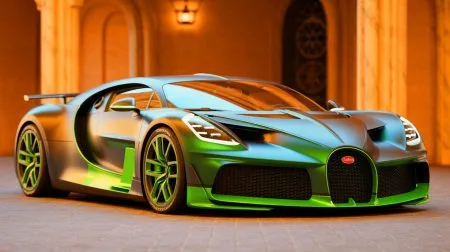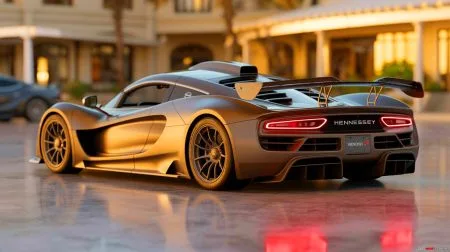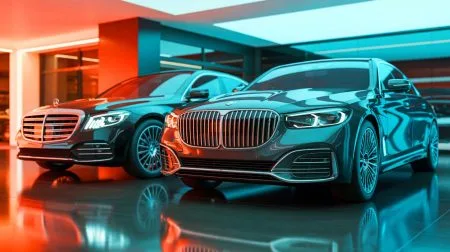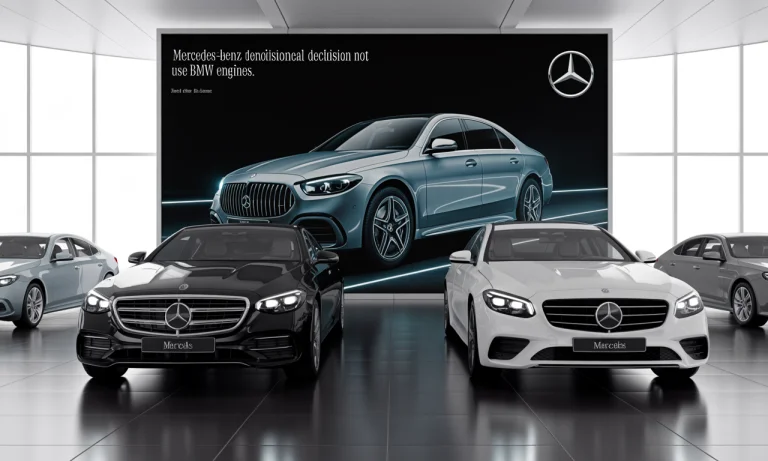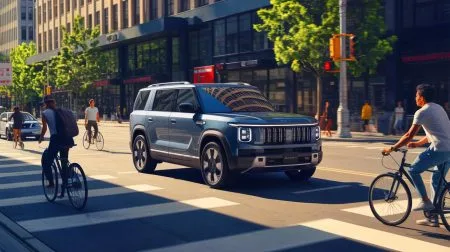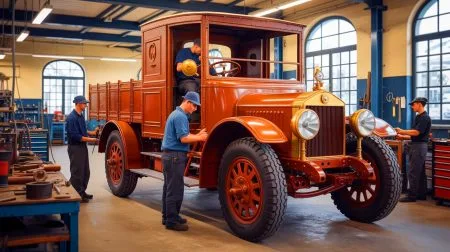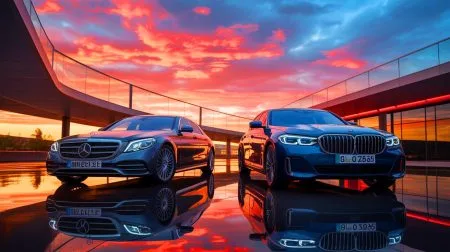The luxury automotive world thrives on both rivalry and intrigue. Recent months swirled with whispers of a seismic collaboration: Mercedes-Benz, under pressure from evolving emissions standards and rising development costs, would allegedly turn to archrival BMW for its heralded B48 four-cylinder engines. As anticipation built amid automotive fans and industry analysts—many recalling legendary rivalries between Mercedes, BMW, Audi, Volkswagen, and Porsche—a sudden twist unraveled the narrative. Markus Schaefer, Mercedes-Benz Group’s Chief Technology Officer, delivered a resounding denial. Not only were these talks vastly overblown, but Mercedes was steering full throttle on its own path, anchored by a new family of proprietary modular engines. The episode shone a revealing light on the fiercely guarded engineering pride echoing through Stuttgart’s corridors, echoing far into the future of combustion, electrification, and the ever-shifting playground of Europe’s luxury car legends.
Mercedes-Benz’s Engine Strategy: Debunking BMW Collaboration Rumors
Alliances between German luxury titans are rare and, when rumored, often greeted with both skepticism and fascination. The speculation reached fever pitch: would Mercedes-Benz, faced with looming Euro 7 regulations and delayed EV adoption, truly install BMW engines under its hoods? Insiders claimed pragmatic negotiations were underway—perhaps as a cost-saving move, or to accelerate compliance across their compact and plug-in hybrid lines, such as the next C-Class and E-Class. Yet, in a stage-setting announcement at the IAA Mobility Show in Munich, Mercedes made its intentions explicit. “There is no truth to this,” declared Schaefer. Mercedes-Benz not only denied the rumors, it reinforced its commitment to in-house innovation, referencing the internally developed Family of Modular Engines—FAME—forging ahead without external dependencies. The statement did more than quash speculation: It reminded the market that legacy and identity, for brands like Mercedes, outrank expedient partnerships. For readers eager to discover the broader impacts of hybridization on high-performance brands, a dive into modern hybrid supercar efficiency provides fresh insight.
| Engine Platform | Supplier | Emissions Compliance | Model Coverage |
|---|---|---|---|
| FAME (Family of Modular Engines) | Mercedes-Benz (in-house) | Euro 7, China 7, U.S. | All current and future ICE models |
| B48 Turbo Four-Cylinder | BMW | Euro 7 (projected) | BMW, rumored for other brands |
| 1.5L Turbo (Horse Joint Venture) | Mercedes-Benz, Geely | Euro 6d, China 6, others | Compact, collaborative models |
Stuttgart’s Modular Engines: Safeguarding Autonomy and Legacy
It’s 2025, and while the world accelerates toward electrification, Mercedes-Benz stands at a storied crossroads. The company’s Stuttgart engineers reveal a saga of quiet resilience—often overshadowed by headlines about Tesla’s surging software, Jaguar’s risky electrification pivot, or Volvo’s safety obsession. The FAME platform, now at the heart of Mercedes’ roadmap, holds more than four, six, eight, and even twelve cylinders of innovation. Recent prototypes showcase a robust V8, meeting the world’s strictest emissions standards, as well as a V12 for loyalists who decry the quietude of EVs. No detail is spared: the modular nature enables seamless upgrades and ensures compliance from Berlin to Beijing. Those curious how advanced safety tech is evolving across supercars can trace the thread via supercar safety features.
Meanwhile, Mercedes refuses to attribute its success to any external supplier. The conversation might have started as an efficiency play—similar to Volkswagen’s explorations captured in this Volkswagen performance narrative—but in reality, it’s pride, history, and engineering legacy that guide key decisions. Instead of sacrificing engine autonomy, Mercedes shores up its distinctive sound and style, even as regulatory clouds loom. Comparable quandaries surface across the industry; Porsche, Lexus, and Infiniti periodically face their own powertrain dilemmas, but rarely does the essence of identity become so pronounced as in this latest engine saga.
Industry Reactions and Rival Responses: Identity Beyond the Engine Bay
The headlines ricocheted quickly: Mercedes Confirms They Will Not Be Using BMW Engines. The news filter traveled from Stuttgart to Munich, across Ingolstadt—home of Audi—and out to distant corners where Jaguar and Infiniti weighed up similar crossroads. Industry watchers saw parallels beyond the mere hardware. The refusal to cross-pollinate platforms didn’t just secure Mercedes’ “Made in Stuttgart” engine badge. It was a rebuttal against an age of convergence, when even iconic manufacturers like Volvo or Tesla sometimes source components from unlikely places. Making a stand, Mercedes assured its customer base—many of whom invest in vehicles for their uniqueness, as described in this supercar investment guide—that exclusivity remains non-negotiable. Meanwhile, BMW, content in its B48 powertrain’s success, shrugs off the noise, pressing on with its next-generation X7 performance tests, recently detailed in BMW X7 test reports.
In the shadows, Audi advances its electrified fleet, Volkswagen doubles down on EV innovation, and Porsche flirts with both retro and future-facing concepts. Consumers tracking the wave of new supercar tech and alternative fuels can explore bold visions on supercar innovations or hydrogen car advancements. Across showrooms, the move preserves not only engineering direction but emotional differentiation—a Lamborghini V12’s thunder compared to a Lexus hybrid’s hush.
| Brand | Engine Development Approach | Notable Recent Moves |
|---|---|---|
| Mercedes-Benz | 100% in-house, proprietary modular platform | FAME family, electric models, V8 & V12 retention |
| BMW | Mainly internal; selective external ventures | B48 turbo, electrification, emphasis on driver feel |
| Audi | Hybrid; collaborations within VW Group | Move to electric, performance S/RS line |
| Volkswagen | Shared architecture across group | Expansion of EVs, tech leaps, Gymkhana stunts |
| Porsche | High-end engines, EV exploration | Taycan, 911 hybrid rumors, synthetic fuel R&D |
| Jaguar | Outsourcing, electrification push | I-PACE, JLR modular platform |
| Lexus | Hybrid and hydrogen focus | LC Convertible, next-gen hybrids |
| Infiniti | Alliance co-development (Renault-Nissan) | VC-Turbo, shift to EV under parent group |
| Tesla | Electric only; no traditional ICE | Software-led, battery innovations |
| Volvo | Hybrid/EV; Geely tech | XC line expansion, Polestar innovation |
The Road Ahead: Electrification Without Losing the Spark
As electrification gains momentum, Mercedes-Benz displays a unique balancing act. While launching models like the GLC EV priced on par with combustion siblings, the brand preserves its signature drive—illicitly hinting that not all soul is electric. This approach contrasts with Tesla’s full-tilt focus on software and battery innovation or Porsche’s parallel pursuit of synthetic fuels. The narrative threading through boardrooms and testing grounds is clear: identity matters. Whether through advanced connectivity, showcased in this IoT automotive analysis, or aesthetic evolution, brands like Mercedes, Audi, and Jaguar nurture their historic DNA even as regulatory landscapes reshape the road ahead. From autonomous prototypes to the latest Volvo XC refresh, each story boils down to a quest for differentiation—engine, electric motor, or otherwise—at the heart of luxury mobility.
And so, with rumors dispelled and paths diverging, auto aficionados can rest assured: the engines roaring beneath the Mercedes star will remain a proud, internal affair, crafted under the watchful eyes of its own engineers, echoing every ounce of Stuttgart precision for years to come.
Questions about Mercedes, Engine Strategy, and the Automotive Landscape
What was the origin of the Mercedes-Benz engine rumors involving BMW?
The rumors began as industry insiders speculated that Mercedes-Benz might use BMW’s B48 four-cylinder engine to address cost and emissions compliance ahead of tough Euro 7 standards. However, no actual deal was ever confirmed by either automaker.
Will Mercedes-Benz use any engines from outside suppliers in future models?
No, according to CTO Markus Schaefer, Mercedes is fully committed to its own Family of Modular Engines (FAME), ensuring all future combustion engines are developed in-house for compliance and exclusivity.
How do other luxury brands like Audi, Lexus, and Volvo handle engine development?
Approaches range from Audi’s group-sharing with Volkswagen to Lexus’ hybrid focus and Volvo’s tie-ups with Geely. Each brand adapts to emissions mandates and innovation trends differently, as explored in new concept studies like future concept cars.
What role does engine autonomy play in automotive brand identity?
Developing proprietary engines is often viewed as central to a luxury brand’s appeal. For Mercedes-Benz, it forges continuity and uniqueness, while brands like Tesla focus entirely on electrification for identity. For more on this evolution, see supercar design evolution.
Is Mercedes-Benz planning to increase its manufacturing of electric vehicles?
Yes, Mercedes-Benz is balancing its heritage in combustion engineering with a growing EV lineup, underscored by models that match combustion siblings in price and performance. Readers interested in the future of electric luxury can explore shifts in sustainable electric SUVs.
Did you like it? 4.6/5 (28)
